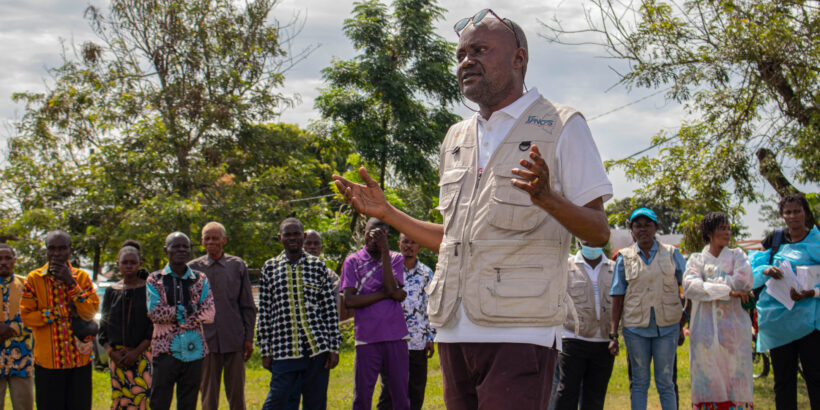To read this blog in French, please click here.
Insects are part of a regular diet for more than two billion people worldwide. Often considered a delicacy, insects are rich in nutritional benefits. In the Democratic Republic of the Congo (DRC), the most commonly eaten insect is the caterpillar, consumed by more than 70% of the population throughout the year. A valuable source of lipids, proteins, and essential micronutrients, caterpillars help to prevent malnutrition and are considered an important food for pregnant women and young children. Caterpillars are both consumed and sold, contributing to food security and financial stability.
Caterpillars in Kwango
In Kwango province, in the western part of DRC, caterpillars are harvested in the bushland surrounding a main river. The caterpillar harvester communities, like many in low- and middle-income countries, lack access to improved sanitation facilities. Consequently, they often defecate directly in the bush and are unable to safely dispose of feces. When heavy rains wash waste into the river—the area’s main water source—it means that families from nearby villages may collect water that is contaminated with fecal matter. This increases the risk of waterborne diseases, including typhoid.
The lack of improved water and sanitation infrastructure in DRC leads to a high prevalence of typhoid and other waterborne diseases. Typhoid outbreaks in DRC are not uncommon, and there is an increasing burden of drug-resistant typhoid. Additionally, the sprawling country of DRC includes many rural communities that lack access to health care facilities. If a person falls ill with typhoid—during caterpillar harvesting season or otherwise—the consequences can be detrimental for the person and their family.
Rural health facilities, when confronted with a surge of typhoid patients, may not have the necessary diagnostic capabilities, antibiotics, or surgical capacity to appropriately treat everyone. When typhoid goes undiagnosed or mistreated, serious complications can result. Typhoid intestinal perforation is the most common and requires surgery to repair. In Kwango province, Doctors without Borders / Médecins Sans Frontières (MSF) and other partners have set up mobile clinics to provide surgeries in areas that otherwise lack access to primary or surgical health centers. The consistently high burden of typhoid, becoming increasingly worrisome as drug resistance increases, means the communities of Kwango and other provinces must be protected against typhoid.
TCVs offer protection against typhoid
Typhoid conjugate vaccines (TCVs) are safe and provide strong protection against typhoid in a single dose. TCVs protect against drug-resistant typhoid, limiting transmission and protecting against further evolution of resistance. TCVs are an extremely effective intervention, and integration with water, sanitation, and hygiene improvements is the most comprehensive approach to typhoid control. While TCVs are not available in DRC yet, local health experts in Kwango have responded to the recent local outbreak by educating community members about typhoid prevention, recognizing symptoms, and knowing when to seek medical care.
Authorities in Kwango province are raising awareness during local gatherings, urging individuals to use proper sanitation facilities, to keep cooking utensils clean, and to boil water before consumption. Nationally, policymakers are making progress to improve the health of communities. The President of DRC held the third National Forum on Vaccination and Polio Eradication, where national government officials and health experts committed to prioritizing typhoid prevention and control. This commitment is great progress for DRC. As climate change intensifies, bringing heavy rains and floods, and drug-resistant typhoid continues to increase throughout the African continent, TCVs are crucial to the health of all communities, including the caterpillar harvesters, in Kwango and throughout the country.
Cover photo: Community health worker speaks outside a health center in the DRC. Credit: Yves Ndjadi, PATH.



